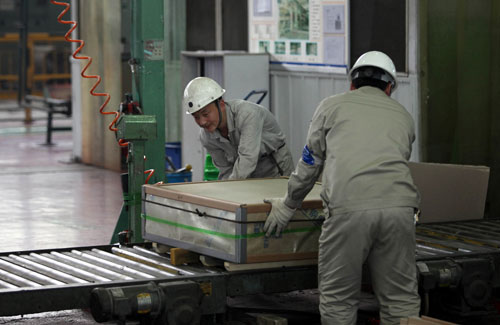Baosteel sells Dim Sum bonds
Updated: 2011-11-29 09:57
By Rachel Evans, and Tanya Angerer, Helen Yuan (China Daily)
|
|||||||||
Nation's second-biggest steelmaker raises $565 million through issue
HONG KONG / SHANGHAI - Baosteel Group Corp has cut its borrowing costs by almost 1.5 percentage points, compared with yields in Shanghai, through the sale of the largest corporate yuan-denominated bond in Hong Kong.
|
 |
|
Workers package steel at the Baosteel Group Corp facilities in Shanghai. Baosteel Group raised 3.6 billion yuan ($565 million) of Dim Sum notes due in two, three and five years on Friday. [Doug Kanter / Bloomberg] |
China's second-biggest steelmaker raised 3.6 billion yuan ($565 million) of so-called Dim Sum notes due in two, three and five years on Friday. The 3.5 percent yield on the new three-year bonds compares with 4.9 percent on outstanding notes due in 2014 sold three years ago by the company's Shanghai-listed unit Baoshan Iron & Steel Co. US industrial companies pay an average 1.66 percent for one-to three-year debt, according to Bank of America Merrill Lynch indexes.
While yields on Dim Sum bonds rose to a record 3.87 percent this month, the Baosteel sale shows that there is still demand for yuan-denominated bonds in Hong Kong. Deposits have more than quadrupled to 622 billion yuan in the past four quarters as China's currency strengthened 3.6 percent versus the dollar this year, the second-best performance of the 25 emerging-market currencies tracked by Bloomberg.
"It is the biggest corporate Dim Sum bond by a very large company and this sends a strong signal to the market," said Rajeev de Mello, head of Asian fixed income in Singapore at Schroders PLC, which oversees $283.9 billion globally, on Friday. "The market was a bit worried before it came, with concerns about the size."
Sales of Dim Sum bonds increased to 144.7 billion yuan in 2011, four times the 35.7 billion yuan of issuance for all of 2010, according to data compiled by Bloomberg. New issues slowed this month to 10.2 billion yuan, down from a high of 19.8 billion yuan in August, the data show.
Yields on Dim Sum bonds have increased 165 basis points, or 1.65 percentage point, this year to 3.88 percent, according to HSBC Holdings PLC's Offshore Renminbi Bond Index. Five-year AAA-rated corporate bond yields in China rose 17 basis points to 5.07 percent, according to Chinabond, the nation's clearinghouse.
Baosteel is the first China-based non-financial company to sell yuan bonds in Hong Kong after receiving permission from the National Development and Reform Commission last month.
Chinese mainland companies previously sold Dim Sum bonds through their Hong Kong subsidiaries or offshore holding companies because they weren't allowed to sell the securities directly.
"This is a milestone deal for the Dim Sum market," said Gina Tang, HSBC's head of debt capital markets for Hong Kong and the Chinese mainland. "This is a transaction that attracted massive levels of investor interest despite the uncertainty that has rocked markets everywhere."
HSBC arranged the sale for Baosteel with China Merchants Securities (HK) Co, DBS Bank Ltd, Deutsche Bank AG, ICBC International Securities Ltd and Standard Chartered PLC.
Baosteel will use the proceeds of the debt sale to boost working capital at its Hong Kong unit designated to develop overseas mining resources and international trade, said Zhou Zhuping, the company's vice-president.
Baoshan Iron & Steel, Baosteel's publicly traded unit, posted a 51 percent drop in third-quarter profit to 1.24 billion yuan from a year ago, the company said in a statement on Oct 28. Sales rose 9.7 percent to 56.2 billion yuan.
"Baosteel should make efforts to boost its control of iron ore resources to guarantee the raw material supply," said Sarah Wang, a Shanghai-based analyst with Masterlink Securities Co. "It's such a large steelmaker, yet its presence on the upstream resources remains low."
China's annual steel production has surged almost five-fold in the past 10 years to 627 million tons last year, driving appetite for raw materials including iron ore and coal.
Bloomberg News











